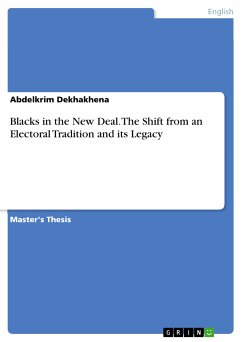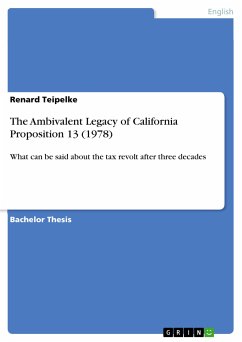Master's Thesis from the year 2010 in the subject American Studies - Miscellaneous, , course: American civilization, language: English, abstract: This thesis deals with the reasons behind the Blacks' shift of commitment from the Republican to the Democratic Party during the New Deal period and its legacy. This recurrent phenomenon comes to the fore with every American presidential election since the first election of Roosevelt in 1932. By the coming of the New Deal they shifted their traditional electoral support to the Democratic Party. In addition, this research probes the motives behind this allegiance by examining Blacks' political, social and economic situation and its effect on the political arena. The electoral powerlessness of Blacks in the 1896-1930 period was as much the product of party affiliation as it was the result of disfranchisement. A concrete reconsideration of this process began to happen in the 1930s, when the Roosevelt administration and the New Deal made circumstances favorable. The Black shift of allegiance is interpreted in different ways: First, in relation to Black protest movements and maturation of political consciousness by the beginning of the 20th century up until the New Deal. Second, in relation to Black labor struggle and interracial issues. Third, through the achievements of Roosevelt's relief policies and the inclusion of Black intellectuals as members within the federal government. The Blacks' outpouring support for Roosevelt in 1936 cannot be explained solely by Roosevelt's initiatives on civil rights over the first New Deal. The strategic importance of Black voters in the North was converted into more federal patronage and awareness. The insistence on economic recovery combined with a sense of inclusion, was the centerpiece of the Democratic appeal to Blacks in the 1936 elections. Finally, the study concludes with an assessment of the shift and its legacy. The electoral strength of this minority increased dramatically between 1940 and 1960 making of Blacks an important constituency for the Democratic Party and changing the scene of American politics. Indeed, the black vote was indispensable to Democratic success signifying a substantial Black sustaining for a Democratic presidential ticket from 1936 to 1960 and eventually forming a decisive majority from 1964 to the present.
Dieser Download kann aus rechtlichen Gründen nur mit Rechnungsadresse in A, B, BG, CY, CZ, D, DK, EW, E, FIN, F, GR, HR, H, IRL, I, LT, L, LR, M, NL, PL, P, R, S, SLO, SK ausgeliefert werden.









